Can stress harm your Munchkin cat? Yes, it can! Learn how to recognize the signs of sickness. By knowing these signs early, you can stop health problems before they start. Recent studies from the JAVMA show that stress affects cats’ health, even our cute Munchkin buddies.
Is your cat getting sick often, dealing with hairballs, or acting strange around its litter box? These are key signs your cat might be stressed and getting sick. Amazingly, you can reduce stress using things like playing with it, playing classical music, and having lots of toys. This can make your cat feel better without needing medicines. It’s time to make sure your Munchkin cat is happy and healthy.
Key Takeaways
- Stress can cause illness in Munchkin cats.
- Symptoms include vomiting, hairballs, and litter box changes.
- Environmental enrichment can alleviate stress-related symptoms.
- Human interaction and classical music benefit cat health.
- Look for early signs and act promptly to ensure your Munchkin cat’s well-being.
Introduction to Munchkin Cat Health Concerns
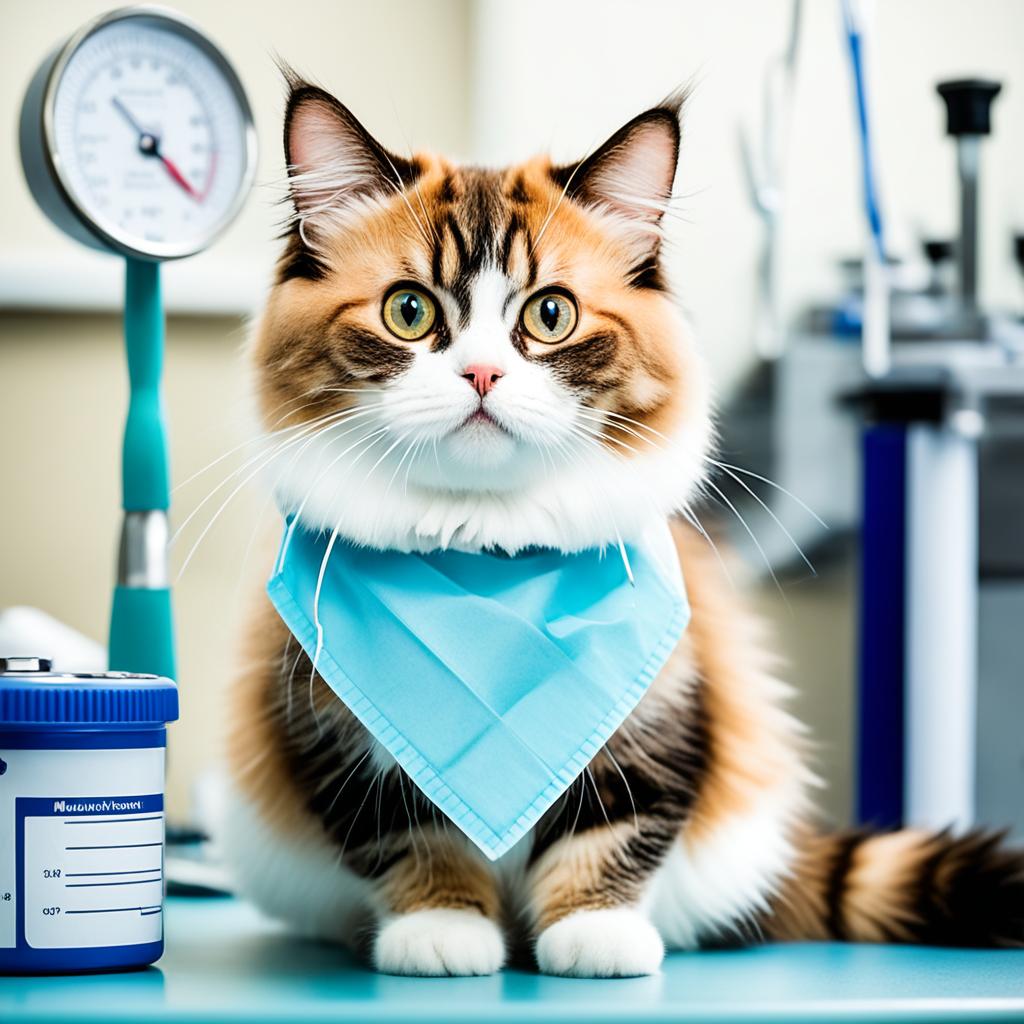
Munchkin cats are known for their short legs and lively nature. These traits come from their unique genetic makeup. While their looks are adorable, they also face specific health issues. Knowing about these problems is crucial for taking good care of them.
Understanding Munchkin Cat Genetics
The genetic story of Munchkin Cats is both interesting and intricate. Their short legs are due to a genetic twist that’s passed down dominantly. A particular change in the UGDH gene causes this feature. Even though they look charming, their genetic past can lead to health troubles.
Common Health Issues in Munchkin Cats
Munchkin cats can struggle with several health issues. Deformities in their legs can cause problems like osteoarthritis. Some cat clubs hesitate to accept them because of concerns about their well-being. This stand reminds us of the health risks these cats might face.
To take care of Munchkin Cats, we need to know about their genes and health problems. Good care, including regular vet visits, can lessen these risks. This ensures they live a healthy life.
Recognizing Sickness in Munchkin Cats

Spotting sickness in Munchkin cats early is key. These cute cats, known for their short legs, need extra attention. Keep an eye out for any little changes in how they act or look.
Watch out for possible bone and joint problems. Although they might not show at first, catching issues early is critical. Early Munchkin Cat veterinary care helps keep your pet in top shape.
Here are a few signs to look for:
- Changes in mobility or reluctance to jump
- Noticeable stiffness or pain in limbs
- Increased lethargy or withdrawal
- Unusual vocalizations, indicating discomfort
Knowing what health problems Munchkin cats might face is important. This helps to find and treat issues quickly. Fast action with Munchkin Cat veterinary care can stop problems from getting worse.
Keeping an eye on your Munchkin cat is vital. Make sure to work with a vet who knows about these special cats. This will ensure your pet is as healthy and happy as can be.
What Are the Signs of a Sick Munchkin Cat?
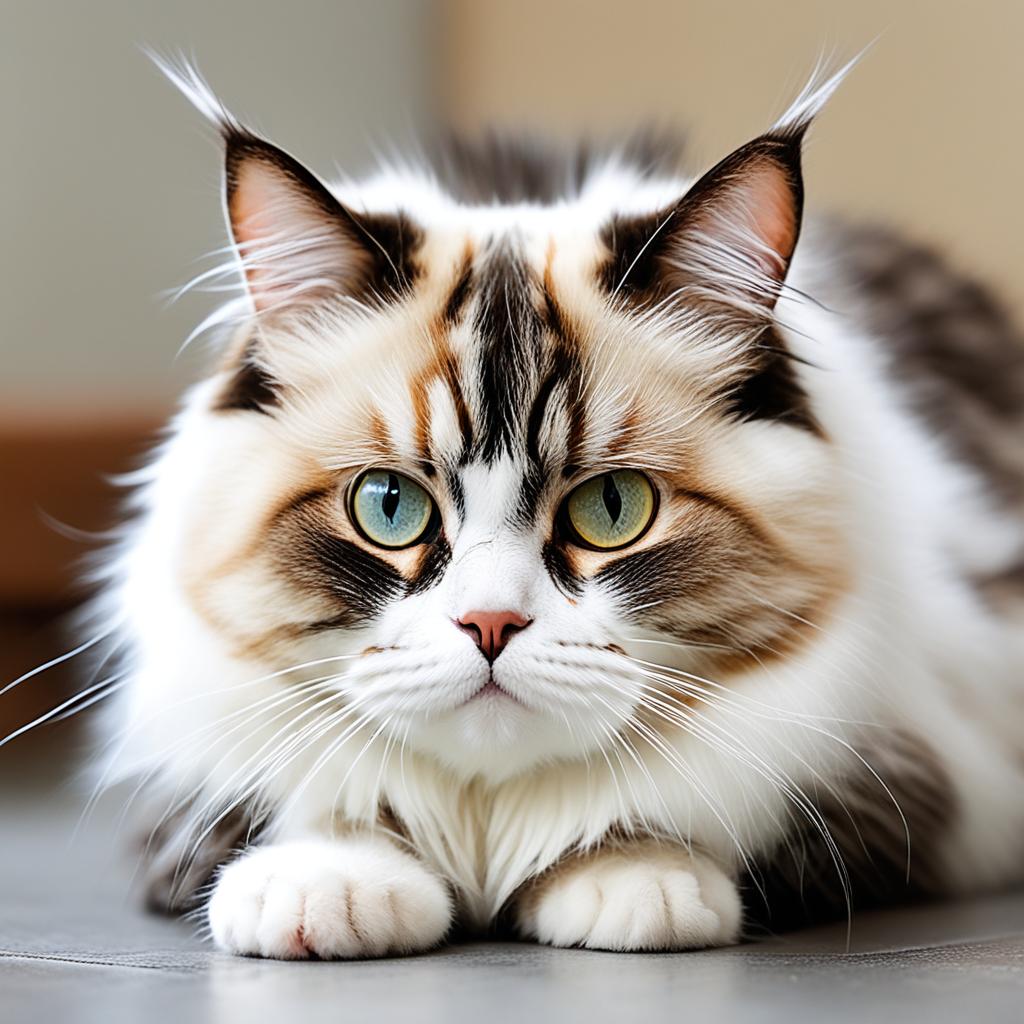
It’s vital to spot when your Munchkin cat is sick. Knowing the signs helps you get them the care they need. Watch for any physical or behavior changes. These could signal a health issue.
Physical Symptoms
There are many physical signs a Munchkin cat might not be feeling well. Watch for things like:
- Vomiting
- Changes in litter box habits
- Reduced appetite
- Weight loss
- Difficulty breathing
Behavioral Changes
Behavior changes can also show if your Munchkin is sick. Keep an eye out for:
- Decreased activity
- Avoidance of social interaction
- Unusual aggression
- Excessive grooming or neglecting grooming
- Hiding
Environmental Factors Leading to Illness
Several things in the environment can make a Munchkin cat feel worse. These include:
- Temperature changes
- Alterations in care routines
- Poor diet
- Lack of environmental enrichment
“Stress-related health issues in Munchkin cats underscore the importance of a stable, enriched environment filled with both physical and mental stimulation.”
Pay close attention to your Munchkin Cat’s health. Being alert will let you act fast. From physical signs to changes in behavior, knowing what to look for can keep your Munchkin cat happy.
Common Illnesses in Munchkin Cats
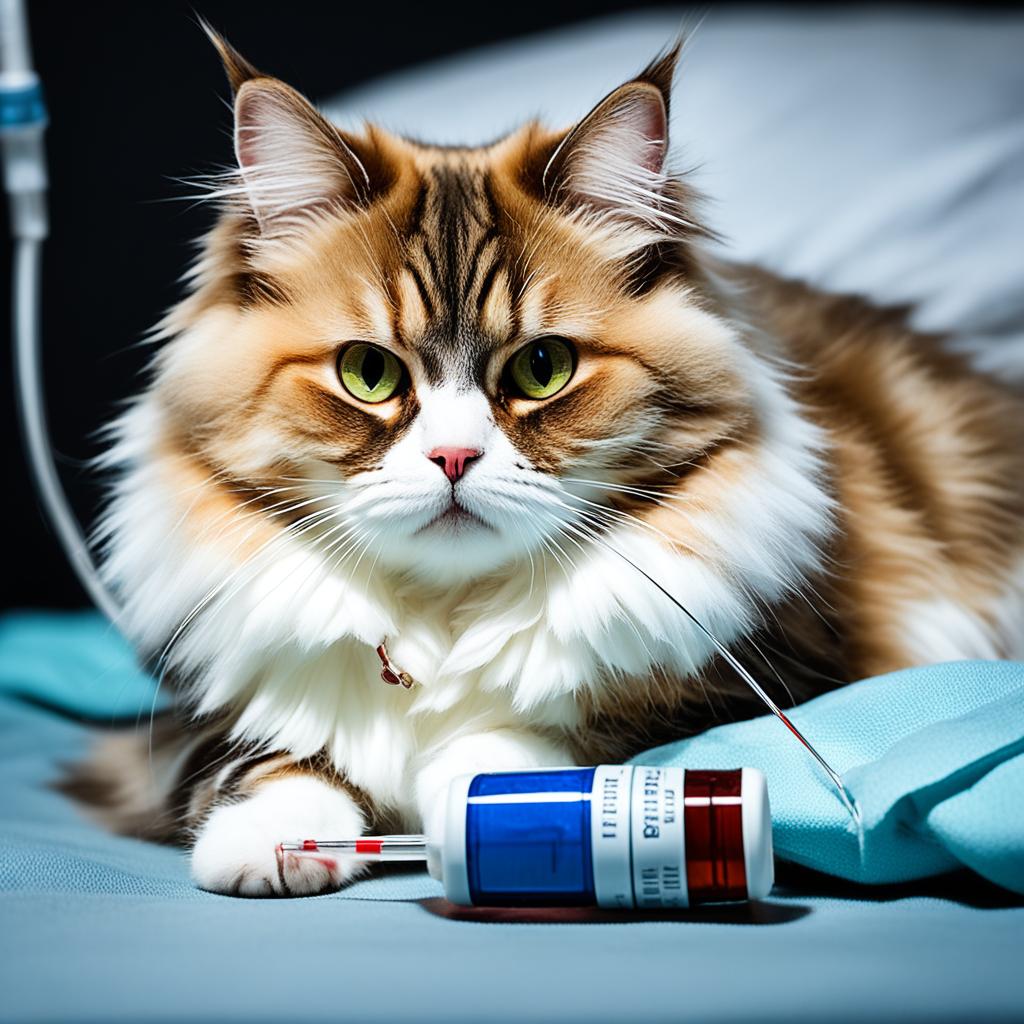
Munchkin Cats are lovely but face health challenges. Knowing these issues can help you spot trouble early. This way, you can take better care of your furry friend.
Genetic Disorders
Much of the health problems in Munchkin Cats come from genes. They might get lordosis, where their spine muscles are too short. This can make cats look like they have a swayback.
Pectus excavatum causes a cat’s chest to look sunken. It’s another genetic issue Munchkins might have.
Infectious Diseases
Even with genetic concerns, Munchkin Cats face risks from infections. This includes colds and more serious diseases like FeLV. Vaccinations and regular check-ups help keep them healthy.
How to Tell If My Munchkin Cat is Sick
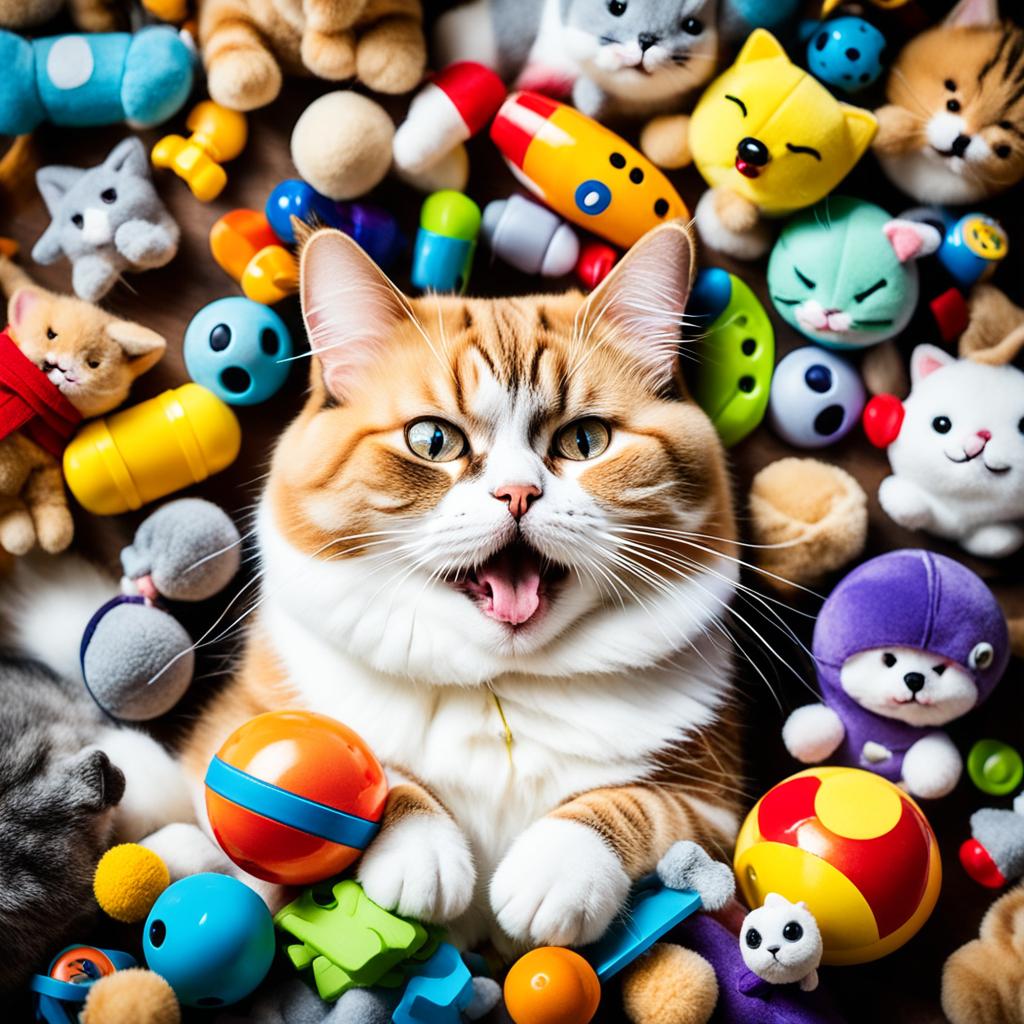
Understanding how to tell if my Munchkin Cat is sick is crucial for their well-being. Look for unusual changes in their daily life. Is your Munchkin Cat skipping meals, or acting less friendly or more aggressive?
Changes in behavior can be a red flag. If your cat is avoiding usual spots or seems less outgoing, it’s time to pay attention. Also, take note if your cat is grooming less than usual. Cats do a lot of self-grooming, so any drop in this activity could mean something isn’t right.
“Changes in appetite, sleep patterns, or interactions with family members can signal health issues,” notes veterinarian Dr. Jane Smith.
Keeping an eye on your cat’s routines will help you catch any health problems early. Here’s a table to compare signs to look out for:
| Behavioral Signs | Physical Signs |
|---|---|
| Increased reclusiveness | Changes in appetite |
| Aggression | Less grooming |
| Reduced playfulness | Lethargy |
| Unusual vocalizations | Vomiting |
Being observant and recording these signs can help you address health issues quickly. Always remember that catching a problem early is key to keeping your pet healthy.
Stress and Its Impact on Munchkin Cat Health
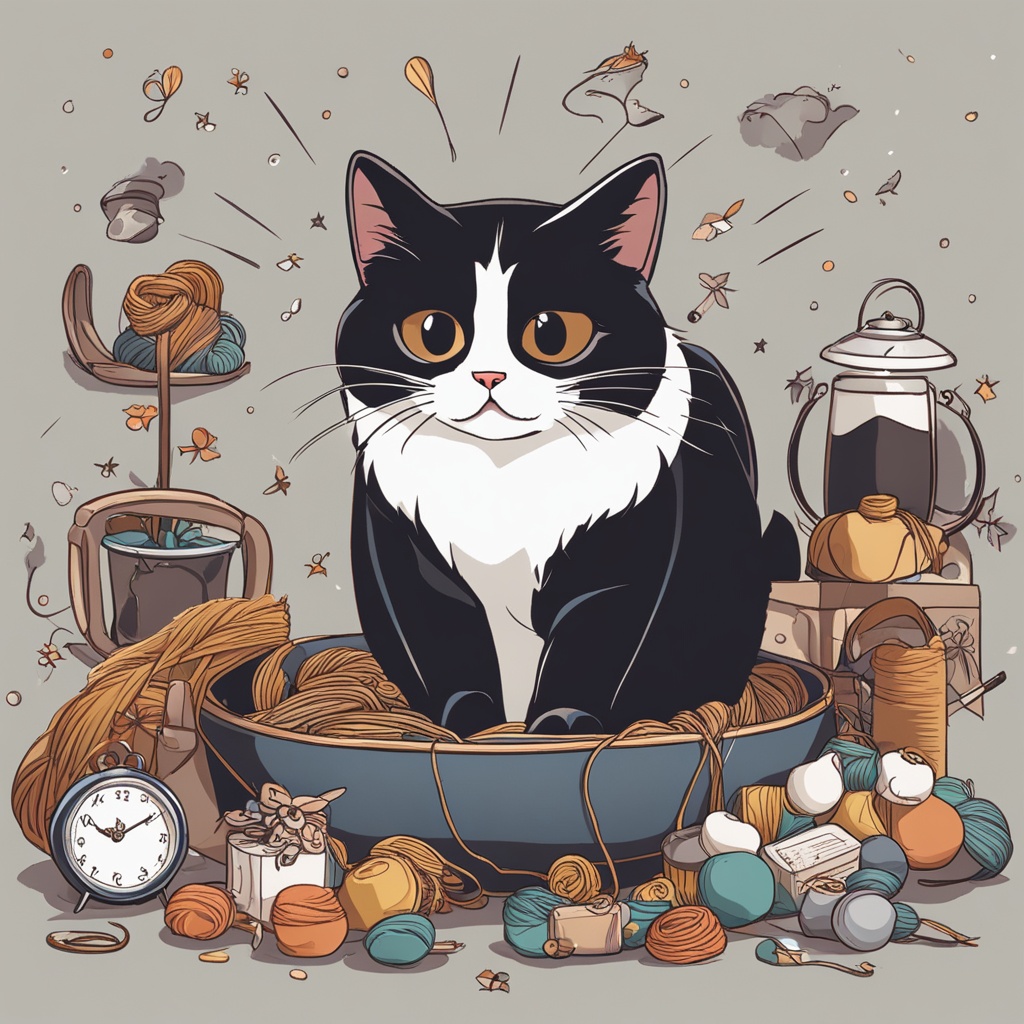
Is your Munchkin cat stressed? Many owners go through this. These cats, with their adorable short legs, can easily become stressed. This can harm their health.
Signs of Stress-Related Illness
It can be tough noticing stress in Munchkin Cats. Look for signs like throwing up, changes in bathroom use, or hiding. They might also show less interest in their usual activities.
These changes are small at first but could get worse. It’s key to act fast.
How to Reduce Stress in Munchkin Cats
Making a peaceful and fun space can help. Follow these tips:
- Give your cat things to do like toys and scratching posts.
- Stick to a set schedule for food and play.
- Take time each day to pet, groom, and talk with your cat.
A stress-free home is vital for your Munchkin cat’s health. Regular quality time and a calm environment are key. Following these steps will lead to a happier and healthier furry friend.
Preventive Measures for Munchkin Cat Health
Keeping your Munchkin cat healthy is simpler than you think. A proactive approach reduces their health risks, so they stay healthy.
Regular Veterinary Visits
Regular check-ups with the vet are key. They help spot health issues early, making treatment easier.
Proper Nutrition and Exercise
Good food is vital for your Munchkin cat’s health. A diet that fits their needs keeps them from getting too chubby. This reduces the chance of joint problems and other issues.
But, they also need to move. Even though they can’t run fast, exercise is important. It keeps them strong and fit.
When to Seek Munchkin Cat Veterinary Care
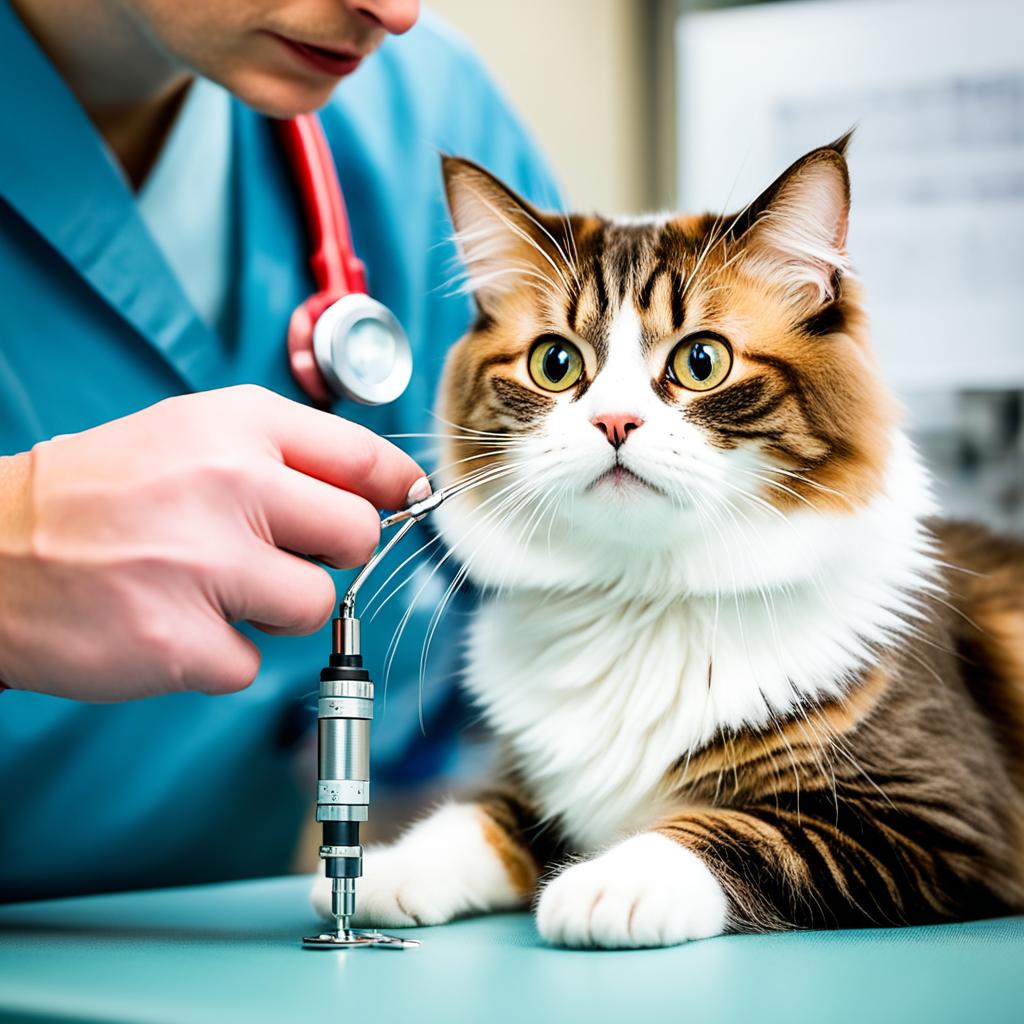
Your Munchkin cat’s health is key to their happiness. Timely vet care is important. Knowing when to get help can really help your Munchkin cat’s health.
Emergency Situations
Don’t wait to get help in an emergency. If your cat is badly injured or can’t breathe, get Munchkin Cat veterinary care right away. A quick response can save your cat’s life.
Routine Check-Ups
Keeping up with check-ups is vital for your Munchkin cat. They help catch health issues early, like thyroid or kidney problems. Being on top of your cat’s Munchkin Cat veterinary care can stop small issues from getting big.
Telling emergencies from regular check-ups is crucial. It ensures your Munchkin cat has a good life. Stay alert and keep your vet’s number handy for quick action.
Home Care Tips for a Sick Munchkin Cat
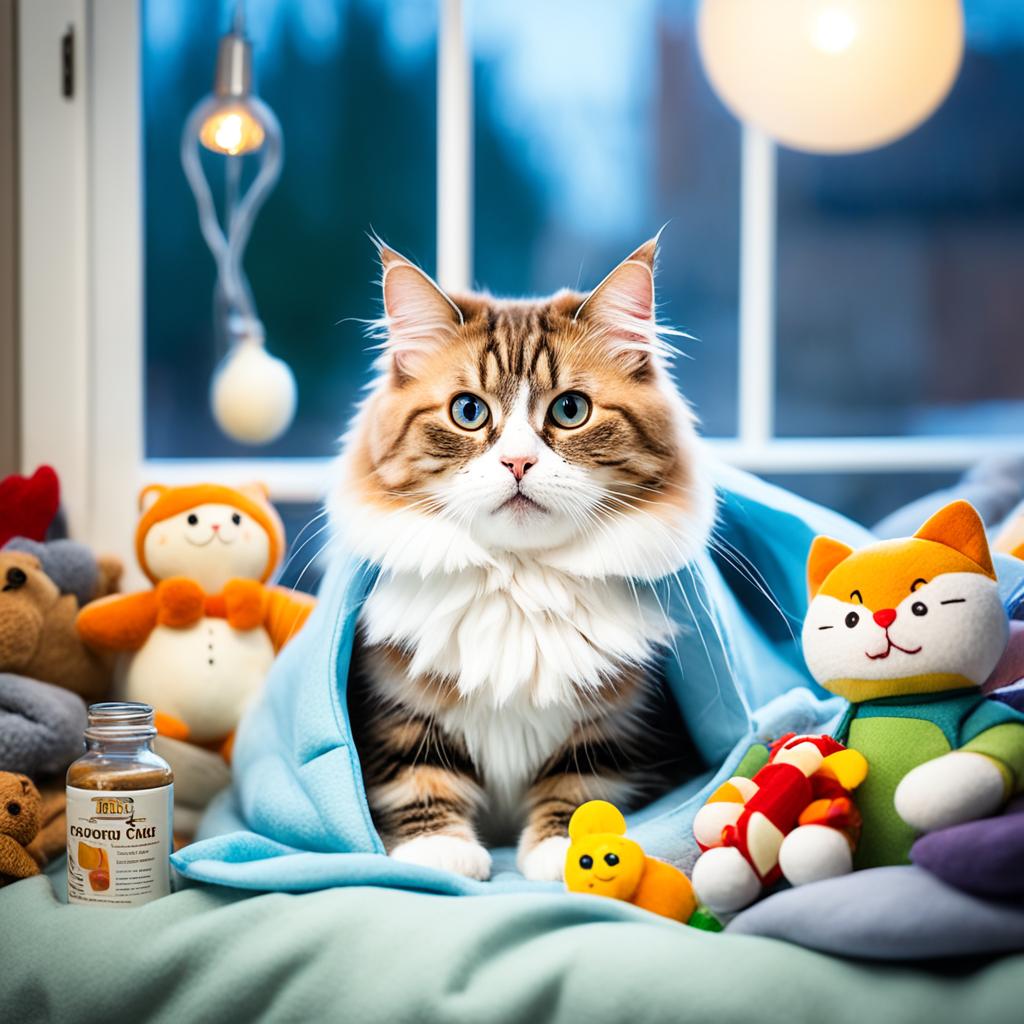
Taking care of your ill Munchkin cat requires special effort. A few good home care tips can help a lot. These unique cats need more care, but don’t worry. It’s not too hard.
First, create a calm place for your sick Munchkin cat. A quiet spot makes a big difference. Set up a warm, quiet area for them. This will help with their recovery by reducing stress.
Keeping them hydrated is also vital. Always have fresh water ready for your cat. You can make drinking fun by adding ice cubes to their water.
Think about their food, too. They need high-quality food that’s easy to eat. Wet food can be a great option because it keeps them hydrated. Sometimes, you might need to feed them by hand. That’s when you play the part of a “cat whisperer.”
Watching over your Munchkin cat is very important. Look for any changes in how they’re doing. Keep track of their symptoms as they heal. Be ready to tell your vet what you see when you visit them.
If your cat needs medication, be sure to give it as the vet instructed. Following the right dose and timing is key to their recovery. You can even use treats to make taking medicine less stressful for your cat.
| Home Care Aspect | Key Actions |
|---|---|
| Environment | Create a stress-free, quiet space |
| Hydration | Provide fresh water and offer ice cubes |
| Nutrition | Feed high-quality, easy-to-digest wet food |
| Monitoring | Observe condition and note changes |
| Medication | Administer prescribed meds as directed |
Addressing Chronic Health Issues in Munchkin Cats
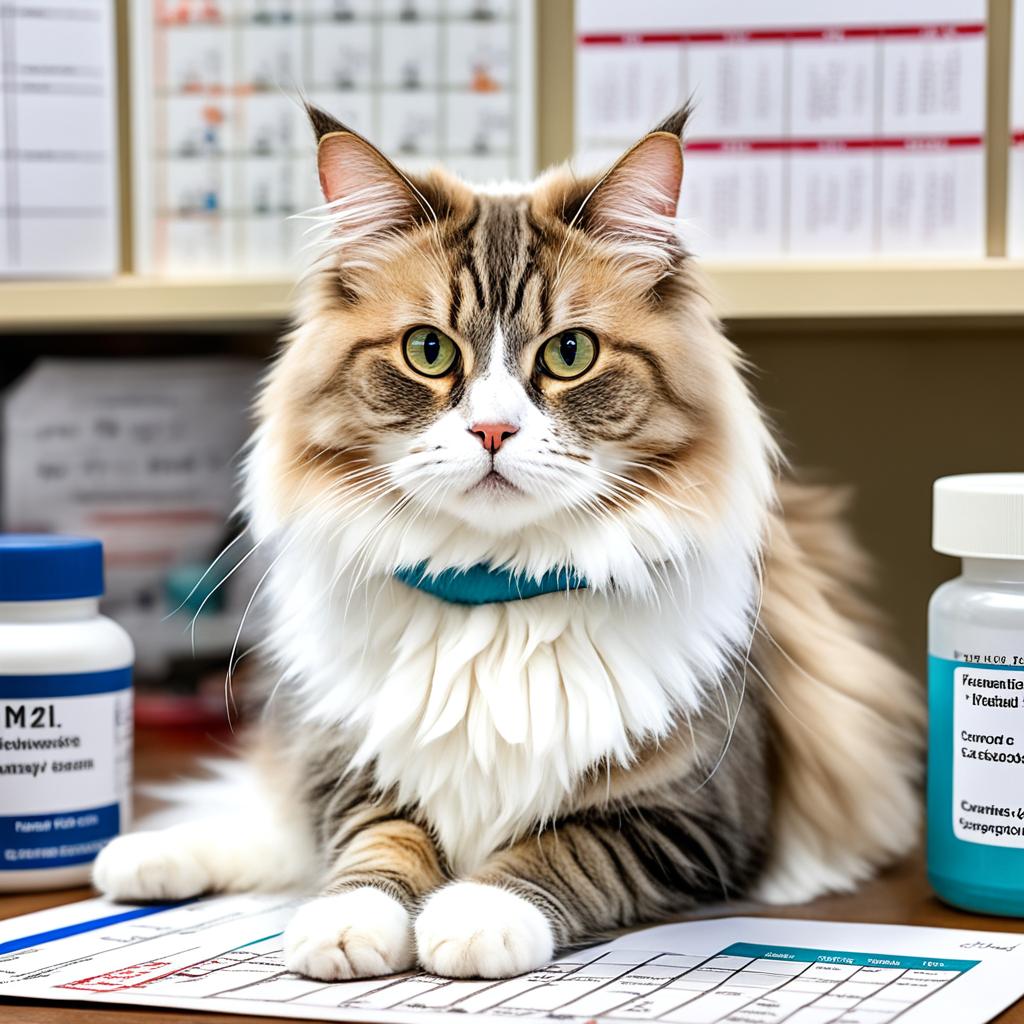
Dealing with chronic health problems in Munchkin cats is key. It calls for knowing their unique needs and ensuring they get regular care. These issues need long-term care and medical help to keep your cat happy.
Long-Term Management
Managing chronic health problems in Munchkin cats need a mix of healthy lifestyle choices, check-ups, and keeping an eye on them. Let’s dive into some important points:
- Visit the veterinarian regularly to keep an eye on health and update treatments
- Help your cat stay a healthy weight to ease joint problems
- Feed them a balanced diet full of key nutrients
- Make sure their living space is calm to avoid making symptoms worse
Medications and Treatments
Treating long-lasting health problems in Munchkin cats involves medications and therapies. Your vet can suggest what’s best for your cat. This could include:
- Medicine for pain, especially for joint troubles
- Supplements to boost joint health and overall health
- Therapies like acupuncture or laser treatments
- Specific diets to tackle certain health issues
Knowing the health issues Munchkin cats often face helps you care for them better. Stay ahead and respond to your cat’s needs, and you’ll improve their life a lot.
Importance of Environmental Enrichment for Munchkin Cats
If you own a Munchkin cat, more than the basics is needed for their well-being. Environmental enrichment is vital for their health and happiness. It helps in tackling health issues by keeping them engaged.
Toys and Play Areas
For your Munchkin cat, a range of toys and play spots is important. These tools keep them moving and thinking. Include interactive toys, puzzle feeders, and climbing spots. These can make sure they don’t get bored and stay healthy.
Social Interaction
Munchkin cats need to be around people and other pets. Playing with you and carefully interacting with other animals is good for their health. It reduces stress and makes them happier.
Conclusion
Knowing about the health worries for your Munchkin cat is key. This helps ensure a long and joyful life for your cat. You can learn to spot signs of sickness early. And you’ll know when your cat needs to see the vet.
Stress is a big deal for Munchkin cats’ health. Making sure they have lots of things to do and a stable home helps. This keeps stress sickness away and makes for a healthier cat.
Regular visits to the vet, the right food, and enough play are must-dos. They help stop sicknesses before they start. By being attentive and involved, you can help your cat stay healthy. In the end, a happy cat means a happy home for you!
FAQ
What physical symptoms indicate that my Munchkin Cat might be sick?
Watch for vomiting and changes in the litter box. These could be diarrhea or constipation. Also, look for a drop in appetite and any weird changes in how they act or clean themselves. These are signs your Munchkin Cat might be sick.
What behavioral changes should I watch for to recognize sickness in my Munchkin Cat?
Pay attention if they’re less active or more private. If they avoid others or act aggressively, they could be unwell. Such behavior shifts may indicate a health problem.
Can stress affect my Munchkin Cat’s health?
Sure, stress is bad for your Munchkin Cat. It can cause stomach issues like vomiting or hairballs. To improve your cat’s health, lessen stress at home. Use toys, engage them with activities, and sometimes, play soothing music. Avoid big changes in their living space, too.
What are the genetic disorders common in Munchkin Cats?
Munchkin Cats often face issues like lordosis and pectus excavatum. These are problems with their spine and chest. Short legs can mean they’re prone to joint problems. So, it’s key to have the vet check them regularly.
How often should I take my Munchkin Cat to the vet?
It’s crucial to visit the vet often. Don’t skip the yearly check-ups. As your cat grows older, they might need more frequent visits. This helps spot and prevent health issues early.
If your Munchkin is vomiting, hiding, or avoiding people, they might be stressed. Less social interaction is another red flag. Add fun things like toys and safe spaces to lower their stress.
How can I reduce stress in my Munchkin Cat?
To reduce stress, make their environment loving and stable. Give them lots of attention and interactive play. Toys and play areas are good, and don’t forget music. It all helps keep them calm and healthy.
What preventive measures can I take to ensure my Munchkin Cat’s health?
Regular vet checks, a good diet, and the right weight are key. Exercising them is important, but do it in a way that’s easy on their short legs.
When should I seek emergency veterinary care for my Munchkin Cat?
If your cat has trouble breathing, appears hurt, or acts very differently suddenly, get them to the vet fast. Immediate care can stop further health trouble.
How can I provide home care for a sick Munchkin Cat?
Make sure your cat is comfy and stress-free. Keep an eye on their symptoms. Give them any meds the vet prescribes. Fresh water and a proper diet are a must.
How important is environmental enrichment for a Munchkin Cat’s health?
It’s really, really important. Play and social activities reduce stress and keep your Munchkin Cat healthy. Use toys and create spaces for them to enjoy.
What chronic health issues should I be aware of in Munchkin Cats?
Munchkin Cats can have long-term health issues like joint pain and skeletal problems. Your vet might recommend special medicine, diet changes, and regular visits to keep their health in check.




